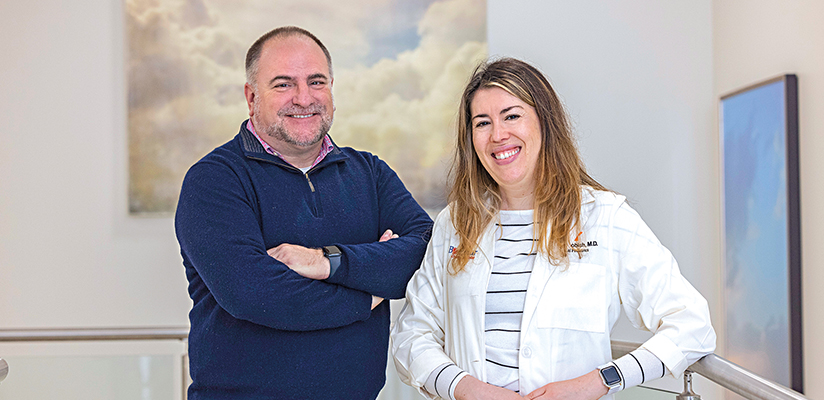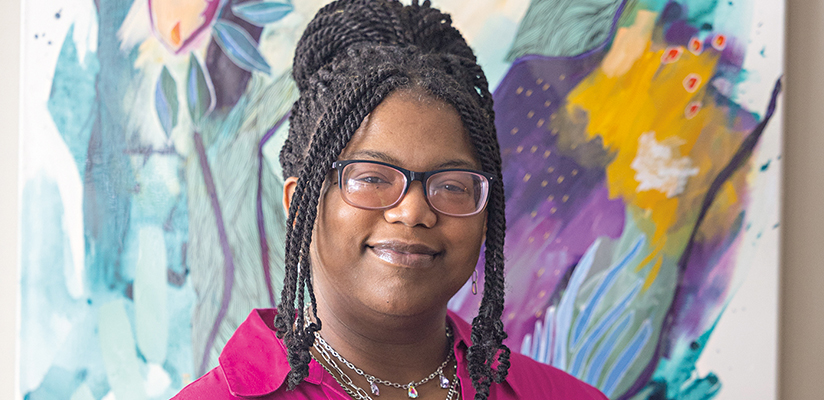Partnering for Success
For Tim Flack, JD, senior attorney of Memphis Children’s Health Law Directive (Memphis CHILD), working for Le Bonheur Children’s Hospital’s medical-legal partnership is near and dear to his heart. His oldest daughter, Madeline, has been a patient at Le Bonheur since 10 months of age when she was diagnosed with four congenital heart defects. Since that time, the Flack family has volunteered on the hospital’s Family Partners Council among other initiatives.
“Working at Memphis CHILD allows me to practice patient- and family-centered care more directly than I ever have, using what I was professionally trained to do,” said Flack. “The collaboration we have with community partners allows us to directly address the legal barriers to health care for the children in our community.”
Launched in 2015, Memphis CHILD is a medical-legal partnership (MLP) that helps low-income families in Shelby County with legal matters affecting the health or well-being of Le Bonheur patients. Medical-legal partnerships place attorneys into health care settings to address legal issues impacting the health of patients. With some funding provided by Le Bonheur and the Memphis CHILD partner organizations, most of the partnership’s funding comes from grants. Any physician, nurse, social worker, therapist or employee who works in a Le Bonheur facility can refer the patient’s family to Memphis CHILD. More than 3,900 referrals have been made since the program began.
Top case areas for Memphis CHILD include Social Security Income (SSI) benefits, education concerns, housing issues, conservatorships and family law.
Each partner, including Memphis Area Legal Services (MALS), University of Memphis Cecil C. Humphreys School of Law, Le Bonheur, University of Tennessee Health Science Center (UTHSC) and West Tennessee Legal Services, plays a unique role in the collaboration to provide comprehensive legal services for kids and families. Memphis CHILD staff include attorneys, social workers, education advocates, law students and professors, a medical champion physician and medical residents.
“Partnership is crucial in the effort to address social determinants of health and overcome the legal obstacles to child health and healing,” said Flack. “Without Memphis CHILD, many of our clients wouldn’t have access to the resources and services we provide.”
A Legal Lifeline
Memphis CHILD is dedicated to helping families navigate legal and medical systems which can seem insurmountable for many. With many clients living in poverty and surviving on incomes of less than $10,000 annually, government funding can be a vital lifeline for families. The MLP helps families appeal denials for SSI benefits and TennCare insurance rejections of physician-ordered medications and services. Memphis CHILD social workers provide recommendations for community resources and assist qualified families with applying for food stamps (SNAP), the Special Supplemental Nutrition Program for Women, Infants, and Children (WIC), Families First (TANF) and other government benefits.

Memphis CHILD also assists with family law matters including securing custody and guardianship for children. For families with children who lack the capacity to make their own decisions as an adult, Flack and Memphis CHILD attorneys help them establish conservatorships to ensure medical needs continue to be met after the patient reaches their 18th birthday.
“Obtaining a written and legally binding conservatorship is cost prohibitive for many families,” Flack said. “We’re able to counsel them, free of charge, on choosing a friend or family member to be a standby conservator and help them face the reality that at some point in the future they may not be able to take care of their child, but with a standby or co-conservatorship, their child will be prepared and cared for.”
Help With Healthy Housing
Memphis CHILD Program Manager Haley Greenwell, LMSW, started as the MLP’s social worker in 2022 and recognizes the high volume of need in the community. In her role, she helps the program evolve to improve services and address new issues.
In 2024, Memphis CHILD received a grant from the state of Tennessee to start the “Strong Families Housing Initiative,” a program intended to serve pregnant women affiliated with Le Bonheur who are experiencing housing insecurity. The Initiative promotes healthy pregnancies and birth outcomes by addressing the social determinants of health surrounding pregnancy, parenthood and housing stability.
Memphis CHILD also partners with local agencies, such as Green and Healthy Homes Initiative (GHHI) and Environmental Technical Services (ETS), to provide healthy homes assessments, conduct home mold and lead testing, and improve conditions for renters.
“Our purpose is to alleviate barriers to getting appropriate medical care or access to much-needed resources,” Greenwell said. “The families we assist are low income and unable to afford the legal services they need, so being able to provide free assistance through Memphis CHILD makes a huge difference for the kids in our community.”
Wraparound Care
For many clients, needs span across several areas of assistance and thanks to a plethora of resources, Memphis CHILD is able to provide coordinated care.
Michael Wooten was referred to Memphis CHILD for help enrolling his daughter, Tamia, in a special education Pre-K classroom as he lacked documentation supporting paternity and custody.
A Memphis CHILD attorney from MALS worked with Wooten to establish paternity and custody of Tamia, as her mother passed away and Wooten was not listed on the birth certificate. Greenwell served as the liaison between the attorney and Wooten, even accompanying him to juvenile court offices. While the attorney was able to establish paternity and custody, Greenwell assisted Wooten in the process of obtaining a birth certificate for his daughter through Tennessee Department of Vital Records, allowing the client to be listed as the father and changing the daughter’s last name to his.
Greenwell also assisted Wooten in obtaining an Individualized Education Plan (IEP) and connected him with Flack to assist with issues related to Tamia’s SSI benefits.
Medical-Legal Partnership
As part of the medical-legal partnership, Le Bonheur Hospitalist and UTHSC Associate Professor Emilee Dobish, MD, spearheads the University of Tennessee Health Science Center’s role in the Memphis CHILD collaboration. Dobish serves as medical champion, promoting the program with Le Bonheur’s medical staff and serving as a resource for cases to interpret medical data.
“It’s important for us to have a conversation about how the diagnosis impacts the child,” said Dobish. “Engagement from all medical disciplines is vital to break down legal barriers for families. Prior to this MLP, the legal issues would never have been on a physician’s radar.”

In March, Dobish and Greenwell partnered with UTHSC Pediatric Chief Resident Ramie Glick, MD, to establish a program called “SSI Clinic” in which medical residents are paired with Le Bonheur patients to complete “Child Disability Reports,” a substantial part of Supplemental Security Income (SSI) applications. Completing the Disability Report involves reading medical records, explaining diagnoses and reporting tests and procedures which can often be tough for families to navigate.
With the assistance of medical residents, families are able to submit more accurate applications with a stronger chance of being approved. Residents also benefit as they gain a better understanding of the barriers facing patients as they attempt to access resources as well as the implications of medical documentation outside of direct patient care.
“Being the medical champion for Memphis CHILD has broadened my understanding of the lives of my patients and families outside of their medical condition. It has changed how I interact with families, as I have a more holistic approach to thinking through the patient and diagnosis,” Dobish said. “For our medical residents, participating in Memphis CHILD provides them with a better understanding of how to advocate for their patients, as pediatricians are often some of the strongest advocates for change.”
While Dobish helps the next generation of doctors learn critical skills to help patients and their families, Katy Ramsey Mason, JD, director of the Medical-Legal Partnership Clinic and University of Memphis Cecil C. Humphreys School of Law associate professor, leads the way with educating law students.
Through the law school’s portion of Memphis CHILD, law students help Mason represent families in education matters, housing issues and conservatorships. Students simultaneously provide free legal services while receiving an education on the intersection of law and health.
As gun violence continues to plague the Memphis community, Mason identified the need for assistance in helping families. Thanks to a grant from Everytown for Gun Safety, Everytown Legal Fellow Abigail Weiss joined Mason’s team in March 2024. Weiss works on typical medical-legal partnership cases, but focuses on families who have experienced gun violence, either directly or in their communities. She also handles a variety of civil legal issues intersecting with gun violence, including housing, education and benefits cases.
Advocacy in the Classroom
Education assistance is a top reason patient families seek help, with more than 40% of 2024’s referrals to Memphis CHILD related to education.
“Our education practice has expanded considerably since I started at Memphis CHILD in 2018 because there is such a huge demand for legal assistance related to children receiving the special education services they’re entitled to,” Mason said. “Through Le Bonheur’s addition of social workers and advocates focused on education, we have been able to accomplish more. They resolve the issues that don’t require a lawyer, but elevate the issues that do need a lawyer’s intervention when necessary.”
A former special education teacher, Memphis Child Education Advocate Tori Long informs clients of their educational rights, provides resources and attends meetings along with the family. Families referred to Memphis CHILD for education issues are seeking assistance as they know their child needs support, but they often do not know, or are unsuccessful in securing what their child needs.

Long helps families advocate for IEP evaluations for children with disabilities in the public school setting to determine appropriate access to special education services. While an IEP creates a plan for specialized learning, Section 504 of the Rehabilitation Act of 1973 prohibits discrimination against students with disabilities in schools that receive federal funding. 504 Plans provide accommodation for students
with disabilities so they may learn in a typical classroom.
“Clients are most often referred either because they are struggling to get an IEP or 504 Plan in place for their child, or their child has an IEP or 504 Plan, but it is not being implemented with fidelity. Lack of fidelity may look like a student not receiving the accommodations, services or supports they are legally entitled to receive,” Long said. “I like to approach my work with patients’ schools with a collaborative and solution-based mindset. At the end of the day, my clients just want to know that their child is safe and supported at school.”
Long occasionally has to utilize the state’s dispute resolution process, but most school staff she works with are willing to learn, listen and improve.
Last year, Leslye Stanback came to Memphis CHILD seeking assistance for her son, Markel. She wanted to enroll Markel in a local postsecondary vocational school that specializes in preparing students who have graduated with a special education diploma for life after high school through teaching independent living skills, going on community outings, and preparing students for employment.
Under the Individuals with Disabilities Education Act (IDEA), eligible students may receive special education services until age 22, and postsecondary transition planning is a required component of every IEP. Yet these services were not being provided to Markel.
After many meetings and phone calls, Long was able to help Markel enroll at the specialized postsecondary vocational school.
“When I heard this news, I held back tears of relief that Markel would finally receive the quality education he deserves,” Stanback said. “I am so grateful for Memphis CHILD’s help because without it I probably would have given up.”
Many families who come to Memphis CHILD for assistance echo this sentiment as they have been fiercely advocating for their children for many years. Thanks to compassionate Memphis CHILD staff, children and their families are getting access to the resources and wraparound services they need to thrive.
Help us provide the best care for kids.
Le Bonheur Children's Hospital depends on the generosity of friends like you to help us serve 250,000 children each year, regardless of their family’s ability to pay. Every gift helps us improve the lives of children.
Donate Now













